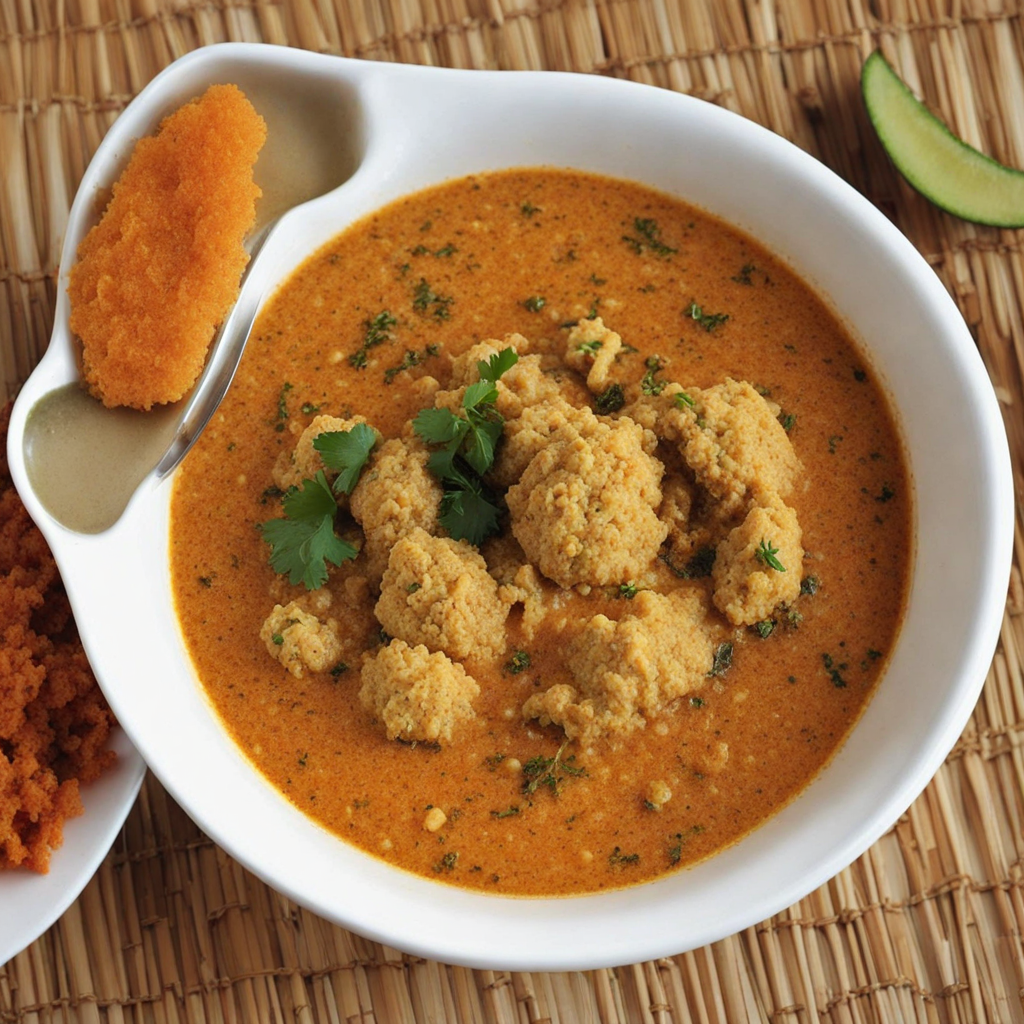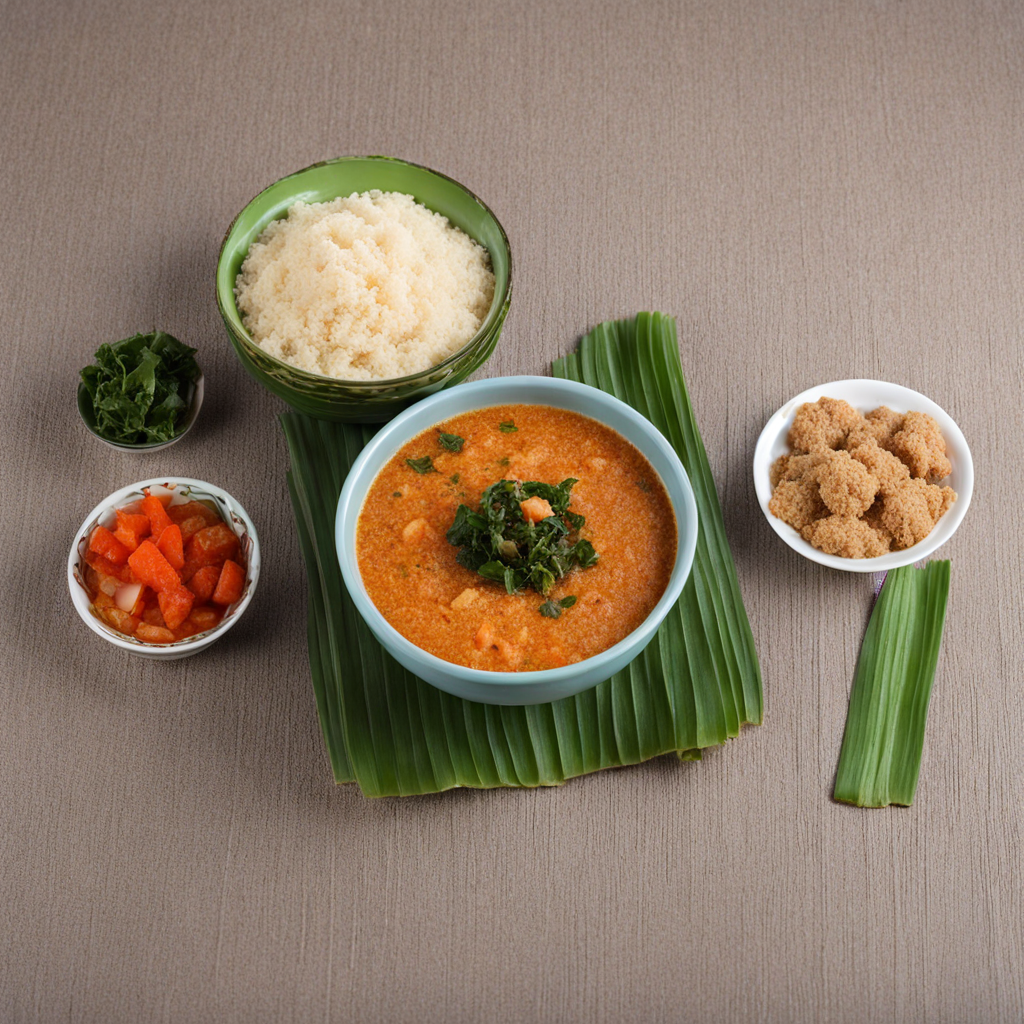Egusi Soup
Egusi Soup is a rich and hearty dish that hails from West Africa, particularly popular in Ghana and Nigeria. It is primarily made from ground melon seeds, known as egusi, which have a nutty flavor and a slightly crunchy texture. These seeds are blended with water to create a thick paste, which forms the base of the soup. The addition of palm oil gives the dish its vibrant orange color, while a medley of spices, onions, and sometimes tomatoes adds depth and warmth to the flavor profile. The result is a deliciously thick and savory soup that is both satisfying and nourishing. In traditional recipes, various ingredients such as leafy greens, meats, and fish are incorporated into the soup, providing a balance of flavors and textures. Common additions include spinach, bitter leaf, goat meat, or fish, each contributing its unique taste to the dish. The combination of egusi seeds and protein not only enhances the soup's richness but also makes it a wholesome meal packed with nutrients. Served over a side of fufu, rice, or plantains, Egusi Soup is perfect for soaking up its deliciousness, making every bite a delightful experience. What sets Egusi Soup apart is its versatility; it can be adapted to suit different dietary preferences and ingredient availability. While the traditional recipe is cherished, many modern interpretations experiment with vegetables, spices, and alternative proteins, allowing for a creative twist on this beloved dish. Whether you're enjoying it at a local Ghanaian eatery or preparing it at home, Egusi Soup promises an explosion of flavors, inviting those curious about West African cuisine to explore its rich culinary heritage.
How It Became This Dish
Egusi Soup: A Culinary Treasure of Ghana Origins of Egusi Soup Egusi soup, a rich and hearty dish originating from West Africa, holds a special place in the culinary landscape of Ghana. The name "egusi" comes from the melon seeds (Citrullus lanatus) that are used as the primary ingredient. These seeds, often referred to as "melon seeds," are not only nutritious but also serve a crucial role in the preparation of this beloved soup. The origins of egusi soup can be traced back to the indigenous practices of the Akan and Ewe peoples of Ghana, where the cultivation of melons and other legumes has been a long-standing tradition. These communities have relied on local agricultural products to sustain their diets, and egusi seeds became a staple due to their high protein content and versatility. Initially, the soup was a humble dish, prepared primarily for local families, but its rich flavors and nourishing qualities gradually led to its rise in popularity. Cultural Significance Egusi soup is more than just a meal; it embodies the essence of Ghanaian culture and community. Traditionally prepared for communal gatherings, celebrations, and family feasts, this dish symbolizes unity and togetherness. During important ceremonies, such as weddings and festivals, egusi soup is often served alongside fufu (a starchy side made from cassava, yams, or plantains), making it a centerpiece of the dining experience. The soup itself is deeply rooted in the social fabric of Ghana. It serves as a means of expressing hospitality, where families invite guests to share in their abundance. In many regions, the preparation of egusi soup is a communal activity, with members of the family or community coming together to cook, share stories, and bond over the meal. This practice strengthens social ties and reinforces cultural traditions, making egusi soup a symbol of togetherness and cultural pride. Ingredients and Preparation Traditionally, egusi soup is made by grinding the dried melon seeds into a fine powder, which serves as the thickening agent for the soup. The dish is typically prepared with a variety of ingredients, including leafy greens (such as spinach or bitter leaf), tomatoes, onions, and a variety of meats or fish, such as chicken, goat, or smoked fish. Spices and seasonings, including pepper, ginger, and garlic, are added to enhance the flavor. The preparation process involves sautéing onions and tomatoes in oil before adding the ground egusi seeds, which are stirred in to create a rich and creamy texture. The soup is then simmered with the chosen proteins and greens until all the flavors meld together. This method not only highlights the unique flavor of the egusi seeds but also showcases the use of local ingredients, reflecting the agricultural heritage of the region. Development Over Time As Ghanaian cuisine evolved, so did the preparation and presentation of egusi soup. While the traditional recipes remain cherished, modern interpretations have emerged as cooks experiment with new flavors and techniques. The globalization of food culture has introduced variations and adaptations of egusi soup, allowing it to reach a broader audience. In urban centers, where access to diverse ingredients is more prevalent, chefs have begun incorporating international influences into egusi soup. For instance, the addition of coconut milk, spices from Asian cuisines, or even the fusion of egusi with other regional soups has become popular among contemporary cooks. These innovations have not only modernized the dish but also showcased its versatility, making it appealing to younger generations and food enthusiasts. Furthermore, the increasing awareness of health and nutrition has led to a revival of interest in traditional dishes like egusi soup. As people seek out wholesome, natural foods, the high protein content and healthy fats found in egusi seeds have drawn attention to the nutritional benefits of the dish. This shift has encouraged a new generation of cooks to embrace traditional recipes while also adapting them to fit modern dietary preferences. Global Influence In recent years, egusi soup has gained international recognition, transcending borders and becoming a favorite in African restaurants across Europe, North America, and beyond. The diaspora communities have played a crucial role in popularizing the dish, often serving it at cultural events and gatherings. As more people become familiar with West African cuisine, egusi soup stands out as a quintessential representation of Ghanaian culinary heritage. Social media has also contributed to the global popularity of egusi soup, with food bloggers and influencers showcasing the dish on platforms like Instagram and TikTok. The vibrant colors and rich textures make for visually appealing content, attracting attention from food enthusiasts eager to explore new flavors. This digital exposure has sparked interest in traditional cooking methods, encouraging home cooks to recreate egusi soup in their kitchens. Conclusion Egusi soup is a remarkable culinary creation that encapsulates the history, culture, and community spirit of Ghana. From its humble beginnings as a local dish to its status as a beloved staple in Ghanaian cuisine, egusi soup has evolved while remaining true to its roots. The dish serves as a testament to the richness of the Ghanaian culinary tradition, highlighting the importance of local ingredients and communal cooking practices. As egusi soup continues to develop over time, it stands as a symbol of resilience and adaptability, bridging the gap between past and present while maintaining its cultural significance. Whether enjoyed at a family gathering, a festive celebration, or a trendy restaurant, egusi soup remains a cherished dish that nourishes both body and soul, inviting people to share in the warmth and hospitality of Ghanaian culture.
You may like
Discover local flavors from Ghana







